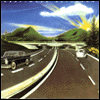
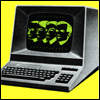
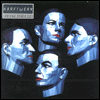
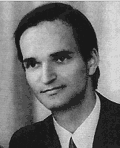
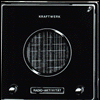
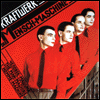
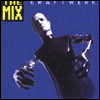
KRAFTWERK,
THE FOLKLORE OF THE TECHNOLOGICAL ERA
By: Marc Moch
Original Version (in catalan) available here.
They are the most important band, the most essential group, in the history of electronic music (and certainly, the great stars of Sonar'98). Kraftwerk are unanimously considered to be the great masters, the absolute pioneers, the predecessors of almost all styles using machines that have been created in the last twenty years. Perfectionist as they are to the highest degree, their production rhythm is very slow indeed.







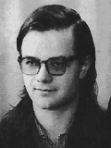
"Music will always contain ideas, will always go on". This vocal line of
"Techno pop", a theme from the album "Electric cafe" could well be a
good synthesis of the philosophy that presides Kraftwerk's work. In the
project that Ralf Hutter and Florian Schneider lead
since almost thirty years ago, musical creativity and "ideas" - the reflection
on all that they perceive - have the same importance. We could even say that they are two
parts perfectly interconnected, which mutually feedback each other, and from this synergy
comes one of the most peculiar, extraordinary bands from the twentieth century, perhaps
the one that has best helped music and the attitudes surrounding it to evolve. Obviously,
the concept of Kraftwerk as a band of "global art" kept
establishing itself as time went by, yet the aesthetic and musical interests of Hutter
and Schneider have kept constant since their first steps. These take
place, what's more, at a certain time and under certain circumstances which were quite
sensitive to the insert of a load of intellectualism in the world of rock music: the late
sixties, a time of revolutions and transgressions of all kinds, and in Germany, right in
the midst of the explosion of what was called "krautrock" or "German
rock".
Ralf Hutter and Florian Schneider met at the
Kunstakademie (Art Academy) in Remschied, a small town near Dusseldorf, and became good
friends when learning Improvisation at the Conservatory of the capital city of the land of
Septentrional Renania-Westfalia. Hutter was the son of a doctor, and was interested in the
happenings and events of Fluxus and other bands of "performance
art". Florian had been listening to the collection of classical and
avantgarde music of his father -Paul Schneider, a prestigious architect-,
since he was a child, as well as rock and pop music on the radio. As is seems, Stockhausen,
Pierre SchaŽffer, Luigi Russolo, LaMonte Young and other avantgarde musicians
were the ones who inspired them best when they began to try make music together. Their
first known band -a quintet- was called Organisation. Hutter
played the organ, Schneider the flute and the violin, and there also was
a singer, a bass, and a percussionist. The only album they published,"Tone
Float" (1970) contains echoes of Pink Floyd and the psychedelic rock
of those years, together with fragments inspired in Stockhausen,
suggestions of a rhythmic, repetitive percussion (pre-industrial?), notes of the virgin
territory Kraftwerk were about to tread.
Actually, Hutter and Schneider register
"Kraftwerk" soon after dissolving Organisation, in the summer
of 1970. The maturity that, above all at a conceptual level (rather than at a stylistic
level) they present in that first LP is quite surprising indeed. The cone on the cover,
the photograph of a huge electric generator on the two sides, the name of the band itself
(Kraftwerk means "electric power plant" in German), everything
is a reference to industry, understood in a cold, objective, scientific way. Music is a
strange exploration of sounds produced by acoustic instruments, percussion and (at times)
melody, with some pre-mechanical rhythms, so far from rock as it is from the cosmic
convolutions produced with the big synthesizers of Klaus Schulze and the
bands in their surroundings. The most remarkable piece is "Von Himmel Hoch",
with some almost industrial passages that suggest what, eight or ten years later, will
become a true genre. "In those times, in Germany, we did not have any immediate
reference of new music and the influence of pop was something that came to us from
outside. Our cultural background and our education were framed into an urban, industrial
stage. We did not live in China or North Africa; the way of life that, for instance,
country may mean for the inhabitants of Texas or Oklahoma did not have any sense in such a
place as Dusseldorf. It looked strange, and uncomprehensible then, yet the industrial
music we developed was our brand of ethnic music", Hutter explained
on issue 38 of Spanish magazine Ajoblanco. Therefore, their work develops against the flow
of almost all governing cliches, above all, those of the rock culture (together with those
of the kind of snobbish, elitist existentialism and intellectualism having their epicenter
in Paris). In front of the false universalism of rock, they build a kind of electronic
music that "truly is a world language, the music of the global village" (Hutter,
1991), yet fully inspired in what is nearer to them, the industrial, cultural and social
reality of their home town, their country, the things they see and use every day.
"Other bands such as Tangerine Dream, even if they are German, have
an English name, so they create onstage an Anglo-American identity, which we utterly
reject. We want all the world to know we are German." What Salvador Espriu
said about being the more local, the more universal, in fact.
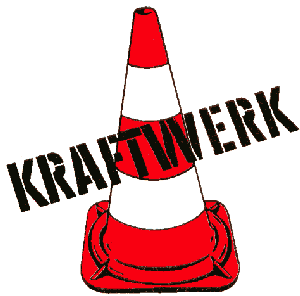
On "Kraftwerk 2", opening with some sort of a suite ("Klingklang",
which will later give its name to their studio) they play more with the drum machine and
the manipulation of tapes. The album that tops this stage is their third one "Ralf
& Florian", a great LP of electronic music, with a cleaner sound, where the
electronic piano and percussion predominate, and where the experiments of the two previous
albums connect with the first attempts of dance pieces ("Tanzmusik"), or the
Hawaiian easy listening and the vocoder ("Ananas Symphonie"). One only needs to
listen to "Elecktrisches Roulette" (a repetitive piece with some almost pop
moments) or "Kristallo", to realise that they have already developed an
absolutely unique musical personality. Nevertheless, the distance separating "Ralph
& Florian" from "Autobahn" (the album which enters them into the world
of pop music, or rather, where they fusion pop with electronic experimentation, it could
be said) is immense. Kraftwerk cover this distance in less than a year,
after getting their first synthesizer, a mini-Moog. Hutter and Schneider
wanted to shape in a theme the fact of driving along a highway, in the same way as the Beach
Boys -who attract them more because of the "psychological structure" of
their songs rather than their music- used to translate the sensations of surfing on the
California beaches. The result is a marvellous symphony of twenty-two minutes and a half,
truly evocative of a trip through a motorway by means of the use of effects similar to the
sounds one hears when driving, a very precise, geometrical mechanical rhythm, repetitive,
hypnotic melodies, the voice through the vocoder repeating a minimal text in German,
synthetic percussion that in some moments takes a greater protagonism. They had very clear
ideas. "We like our music to reflect our daily life. Other people may feel fascinated
by space flights to the Moon and such things. We prefer now to deal with everyday
technology, such as cars, trains and other machines controlled by human beings", they
will say. Since "Autobahn" (which has a cover by Emil Schulz, a
sort of ideologist of the band) Kraftwerk will be a quartet. The album is recorded with Wolfgang
Flur (electronic percussions) and Klaus Roeder (violin and
guitar), but the latter is soon replaced by Karl Bartos. Hutter, Schneider, Flur and
Bartos will become the "classical" formation and the best known one of Kraftwerk.
"Autobahn" is a success in several European countries -curiously enough, not so
in Germany- as well as in the United States, where the band will soon engage on a
twenty-two concert tour. In 1975 a new album is released, "Radio-activity", with
shorter pieces, inspired by the magic of the radio waves and the ether transmitting them,
some as surprising as "Antenna", a sort of electronic rock in the wake of Suicide,
or "The voice of energy", where the first robotic voices that are later to
become routine can already be heard. This album confirms their popularity. And after
motorways and radio waves, an album devoted to trains comes, "Trans-Europe
Express". On the cover, a black and white photo of the musicians, dressed up with
suits typical of the 1930s (a further element of their revolt against the aesthetics of
rock). "The culture of Central Europe was shaped in the thirties, and many of the
intellectual people left for the United States or France, or were terminated. We are
building this once again, right where it ended up, continuing with this culture of the
thirties" Hutter would say, as he has always stood for the link
between the school of Frankfurt and the progressive German culture spoiled by the rise of
nazism. In "Trans-Europe Express" the mechanical rhythms, the synthetic string
arrangements, the incorporating of noises to a musical message, the search for the meeting
point between electronic experimentation and pop music, as well as a subtle sense of
humour, continue to be present. Human emotions are never left out of Kraftwerk's
message, a message of which, one must take into account, "music is only a part
of".
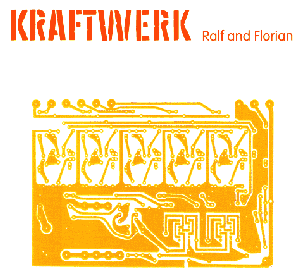
This structure gives a new giant step (together with an evolution of sound and forms) with
"The man machine", an album based on the theories of their authors on the
"bio-feedback" between machines and their users, and that in a way, invents
techno, electro and several further things. The album contains these classical themes of
electronics that are "The model", "Neon lights",
"Metropolis", or the remarkable piece called "The Robots". Everyhting
sounds more synthetic, more compressed. "Our music is rather minimalist. If we can
express an idea with one or two notes, it is better to do so rather than playing a
hundred. With our music machines, there is no need for any kind of virtuoso performance.
All the virtuoso playing is in the machines. Therefore, we concentrate our work on a very
direct minimalism." (Hutter).
In "Computer world" (1981), the pieces are harder, the rhythms syncopated and
the sounds of the machines inspiring them are now those from the electronic devices
("Pocket calculator"). This is a conceptual album on the world ruled by
computers, and an unusual trait is the fact that Kraftwerk abandon their
cold, objective reflection of technology so as to warn us about the dangers of computer
control of the citizens (in "Computer world) or the loneliness that can take place in
this hyperconnected world ("Computer love"). Of "Pocket calculator"
they make different versions in five languages. Mention must be made of the fact that,
since "Radio-activity", there is an English and a German version of the albums
released by Kraftwerk, (and of some, there also are other versions in
other languages). The adaptation of the lyrics implies small variations in the musical
structures, which are much sought by collectors. "The Western world is dominated by
the North-American language. As we are German, we have had to learn other languages. We
sometimes record our songs in different languages, French, and now, Japanese. We feel that
this changes our music completely, therefore we have different variations of our music
and, sometimes, some of the languages even fit much better than others with our
music", they explain in 1981 at a BBC interview. A few years before they had said,
"we produce starting from the German language, our mother tongue, which is very
mechanical. We use it as the basic structure of our music"(..) The language is only
another rhythm pattern, it is a part of our unified sound".
.
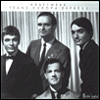
In 1983 the single "Tour de France" is released, a masterful re-creation of
another relationship of man with a machine, in this instance a bicycle. As Hutter
says, "the bicycle is almost a musical instrument in itself. The sound of the chain
and the pedal and the gear, for example, the cyclist's breathing, we have incorporated all
that in the sound of Kraftwerk, injecting the natural sounds into the
studio computers. Kraftwerk have always been a populist band; in our
latest albums we have destroyed the myth of the musical genius and have taught the people
how anyone may play a Casio, how they can make their own music, on their own. Now with the
bicycle it is almost the same -cycling is the most popular sport, everybody can practise
it", they told Pascal Bussy, the author of "Man, Machine and
Music", the only book published about the band.
In 1983 a new LP by Kraftwerk was likewise announced, with the title "Techno Pop". Yet this album never saw the light. As it seems, the control of the new technologies took up all the time of the members of the band. In 1986 "Electric Cafe" was released, an album somewhat irregular, with references to the new rhythms of the dance electronic music, and a first side that may be what was left of the "Techno Pop" project (this is the title of one of the themes) as well as the excellent "The Call Telephone", yet another portrait of everyday technology. The tour planned to present "Electric cafe" was called off, and a period of silence and rumours starts. Kraftwerk appear to sink deeper into the mystery that has always characterized them (while at the same time, curiously enough, pirate albums appear everywhere). Meanwhile, a wealth of new electronic styles and artists appears, most of which claim to have in Kraftwerk one of their basic influences. "In the late eighties, Kraftwerk is a paralyzed giant", says Karl Bartos.
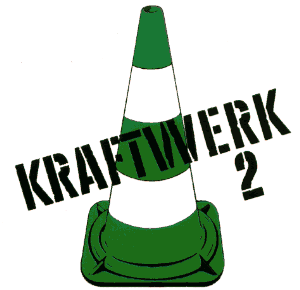
In 1990, Wolfgang Flur and Karl Bartos leave the band.
In 1991 "The Mix" is released, a selection of old themes they have revised and
re-recorded. The version of "Radioactivy" presents a new text. "Chernobil,
Harrisburg, Hiroshima, Sellafield. Stop Radioactivity" they sing, with no ambiguity
whatsoever. Furthermore, the following year they play, together with U2
and other bands, at a festival against the installation of the nuclear plant Sellafield 2.
In 1993, the rumours about the release of new material by Kraftwerk were
constant, and even a new, langer version of "Tour de France" was rumored as
well. Yet time went by and no new album reached the market. In 1997, when their fans had
started to accept the idea that the band had retired, they gave a concert at the Tribal
Gathering festival. The fans who were able to see them praise them to heaven, and explain
that they appeared onstage with black suits and carcasses of a fluorescent green colour
with glasses the same colour, and they played a new theme! The first one in thirteen
years! Later, they have given two concerts, one at the multimedia center ZKM in Karlsruhe,
Germany, and the other in Linz. In this Austrian town they played three new themes, plus a
renewed version of the "Airwaves" in "Radioactivity". The small tour
that takes them to Barcelona is rather curious, as it happens with no new album to be
released, and only includes dates in Tokyo (three), the United States (six) and in Europe,
that of the Sonar Festival, together with only another one in Roskilde, Denmark..
If you wish to purchase any of their recordings you only have to click here.